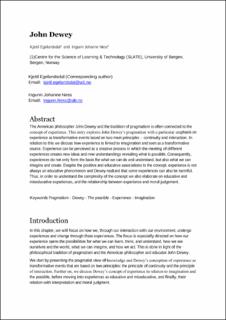John Dewey
Chapter
Accepted version
Permanent lenke
https://hdl.handle.net/11250/2993651Utgivelsesdato
2021Metadata
Vis full innførselSamlinger
Originalversjon
In: Glăveanu V.P. (eds). The Palgrave Encyclopedia of the Possible. https://doi.org/10.1007/978-3-319-98390-5_199-1Sammendrag
The American philosopher John Dewey and the tradition of pragmatism is often connected to the concept of experience. This entry explores John Dewey’s pragmatism with a particular emphasis on experience as transformative events based on two main principles – continuity and interaction. In relation to this we discuss how experience is linked to imagination and seen as a transformative source. Experience can be perceived as a creative process in which the meeting of different experiences creates new ideas and new understandings revealing what is possible. Consequently, experiences do not only form the basis for what we can do and understand, but also what we can imagine and create. Despite the positive and educative associations to the concept, experience is not always an educative phenomenon and Dewey realized that some experiences can also be harmful. Thus, in order to understand the complexity of the concept we also elaborate on educative and miseducative experiences, and the relationship between experience and moral judgement.
